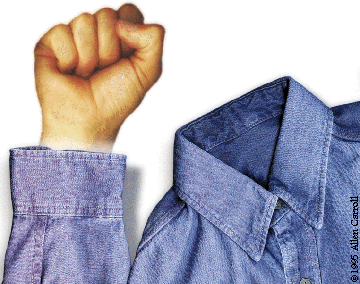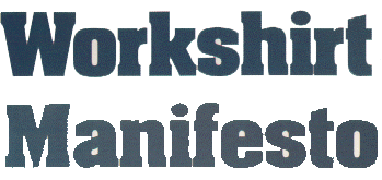 The University of Chicago Magazine August 1995
The University of Chicago Magazine August 1995


The early evening train pulled into Albert Lea, Minnesota, with brakes squealing and slowed to a crawl alongside the Wilson meatpacking plant. The lamps at the corners of the stockyards and the parking lot cast the packinghouse itself in shadow, reminding me of a prison-break scene in some movie I had otherwise forgotten--not a foreign movie, but the regular Hollywood kind I had lately lost interest in.
As we crossed the channel where I used to watch for giant goldfish while Mom waited in the car for Dad to get off work, I could see the depot glowing up ahead. My folks--the word "parents," like "my father," still sounded haughty to me--were standing outside, shivering in the cold and wearing the self-conscious smiles that hold back tears. I knew my dad had already made the rounds to tell everyone he was expecting his youngest daughter--that smart girl who won all the scholarships, the one who got her picture in Wilson's Certified News. She was coming home from the University of Chicago.
I stepped off the train looking like something you might pull out of a cocoon that had cracked open in mid-metamorphosis. My hair was growing out of the bubble-do still fashionable at Albert Lea High School in the early Sixties, but it was not yet long enough to pull back in a barrette at the nape of the neck. Living in a dormitory full of New Yorkers had put an edge of affectation on my southern Minnesota Corn Belt speech, and I was wearing dangling clip-on earrings while I worked up the courage to get my ears pierced. I had an errand to complete over the holidays: to buy a blue workshirt that I could knot at the waist above the new jeans that I wore rolled in wide cuffs halfway up my calves, usually over leather sandals.
I hadn't expected the University of Chicago to require a fashion statement. I had already fashioned an identity for myself in high school that needed no uniform: Girl Intellectual. I had thought myself well suited for the life of the mind that the brochures and catalogs promised. By the end of fall quarter, though, I learned that I would have to dress more deliberately. Manhattan-style sophistication was beyond my capacity, so I opted for quick identification. The workshirt would ally me with the campus radicals, who used fashion to decry fashion. The serviceable blue denim of workshirt and jeans was a political statement, a mark of allegiance with the workers of the world. I could be comfortable in that, I thought. Getting the workshirt in Albert Lea would be less trouble than shopping in Chicago. I figured I could buy one from my dad's sister Vivian at Montgomery Ward.
My dad was the focus of another vacation project. A packinghouse millwright who had always trusted the union and Hubert Humphrey's Democratic-Farmer-Labor Party, he was, I knew, just waiting to be awakened to a broader vision. Hadn't he taught me that rich people aren't happy, that Republicans will do you in for money, that "we...the little guys...the ordinary working people" are little and ordinary precisely because we are too moral to do what it takes to get rich? I had come home eager to discuss with him the socialist ideas that were beginning to satisfy my longings for a just and responsible life.
My first week in college, I had met a boy named Len--short for Lenin, my dorm mates guessed--who was a real socialist, and not just toying with the label. He had joined the Young People's Socialist League in high school, and he pedaled his bicycle around Hyde Park nearly every night, going from meeting to demonstration to party. I rode on his handlebars, wondering whether I was to be a girlfriend, a comrade, or the unthinkable both-at-once.
One night we squeezed into the backseat of a Volkswagen bug in front of the Student Peace Union office and drove the expressways to O'Hare Airport, where we met Madame Nhu of South Vietnam as she disembarked from her plane. "Down with Diem!" we chanted. "Diem or democracy!" It was late October 1963. Within a week, Diem had been assassinated, and the escalating war in Vietnam had become a political issue on campus. With a teenager's grandiosity, I felt personally responsible.
One month later, John F. Kennedy was assassinated. That night I sat on the floor of the dorm hallway with a string of other young women in a spontaneous vigil. My friendship with Len was strained a little by my guilt at having betrayed my Democratic heritage. I had dared to question the efficacy of President Kennedy's liberalism and now he was dead and I was in mourning. Nevertheless, as I left campus for home in December, Len entrusted me with his treasured collection of socialist literature: a green-net shopping bag full of classic Marxist documents, and pamphlets by Hal Draper and Harvey Swados. I promised to show them to my dad.
I don't remember now whether I got Dad to look at any of the pamphlets that I pulled out of the bag and arrayed on the living-room coffee table. When I try to remember, I can only imagine the gold rims on his teeth flashing at my naïvet. But I will never forget what happened with the blue workshirt.
One late afternoon after Christmas, I met Dad in the kitchen as he came in from work, still jingling the car keys in his hand.
"Is it OK if I drive uptown?" I asked. "I need to go to Ward's and buy a workshirt."
He peered at me through his glasses, one bushy eyebrow raised. "A workshirt?"
"Yeah. I want one to take back to school."
"Just a regular workshirt?"
"Uh-huh," I nodded. "A blue one, you know. People wear those at the U of C. They have them at Ward's, don't they?"
"Aw, save your money," he said. "I can get you a workshirt if you want one."
There was a smirk at the corner of his mouth, but it appeared so often, prompted by so much in life, that I thought nothing of it. I went back to my spot behind the drop-leaf dining table at the end of the living room and huddled in front of the heat register with The Brothers Karamazov, trusting that my errand would get done.
The next afternoon, I was too engrossed to jump at the sound of the car in the driveway. It could have been Dmitry Karamazov's footsteps in the kitchen, for all the attention I was paying. Dad's voice roused me.
"Got a present for you," he said.
He was standing in the doorway with a piece of clothing rolled under his arm. Light blue mottled with white--there was no mistaking what it was. He held it out toward me, still rolled, and I felt the cotton as I reached to take it. It was soft to the touch, not so stiff that it would stand out among my classmates' shirts as newly acquired. Just as I grabbed for it, Dad's eyes squinted shut the way they did when he was struggling to contain a laugh or tears, and he let the shirt unfurl in front of me. It was stained by hog blood.
My memory stops there. I can't say what happened next. I don't know if my mother cried, "Gordon! Get that smelly thing out of here," as I imagine she would have. I don't remember Dad rolling the shirt back up again and laying it on the breezeway table until the next morning, when he could tuck it back in his locker at the plant. If I took it, I didn't pack it with the rest of my clothes.
All I know for certain is that at this moment I realized I had truly left home. I would never have to take a job on the sliced-bacon line, which was women's work in the meatpacking industry, nor would I live in dread of a phone call telling me that my husband was on his way to the hospital in an ambulance, having been hit in the head with a carcass or wounded by an errant blade sharp enough to sever joints or slice through bone. But neither could I leave home behind me entirely. When I wore the clean, blue workshirt that I somehow managed to buy myself, I did not feel like the girls from the Long Island suburbs who swished by in the cafeteria line, looking chic in theirs. They had never seen a workshirt put to its original use.
Like many of my peers, I struggled to get to the simple truth at the core of complex social issues, but everything I saw was refracted through a bloodstain that would not allow simplicity. I often felt as though I were invisible and watching from the sidelines as privileged, white, suburban kids playacted at being less fortunate than they were. When students occupied the Administration Building to protest the University's complicity in submitting grade-point rankings to the Selective Service (local draft boards drew from the bottom of the rankings to fill their quotas), I stayed outside, wondering how the nurses' aides who had cared for me as a patient in the University Hospitals were getting by without their paychecks. When the speakers at rallies on the Admin Building's steps spoke in the name of the working class, I said nothing to identify myself.
Playacting or not, the issues were critical. One of the few laborers' kids I had gotten to know dropped out in our junior year and was immediately drafted. His name is inscribed on The Wall in Washington, D.C.
If I count up the meetings I attended, the protests I marched in, the feminist position papers I wrote, I have sound enough credentials to qualify as a Sixties activist. And the diploma on my bookcase confirms that Girl Intellectual simultaneously mastered the life of the mind. Yet I read "Ph.D." as "Packinghouse Daughter." I find that I still experience the world as a working-class kid away from home. And I can't recall that time without also remembering my ambivalence, the dark blotch of reality on my sky-blue illusions.
 Cheri Register, AB'67, AM'68, PhD'73, a writer who lives in
Minneapolis, is at work on a memoir/documentary about small-town
working-class life on the verge of the Sixties. This essay was first
published in the Spring 1995 issue of Hungry Mind Review.
Cheri Register, AB'67, AM'68, PhD'73, a writer who lives in
Minneapolis, is at work on a memoir/documentary about small-town
working-class life on the verge of the Sixties. This essay was first
published in the Spring 1995 issue of Hungry Mind Review.